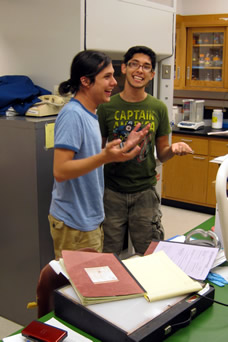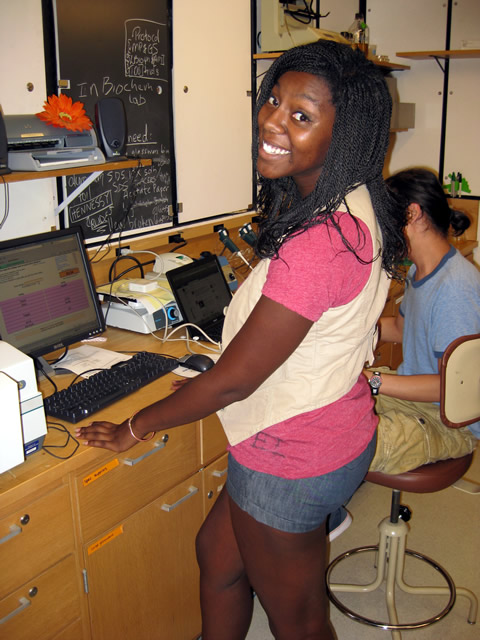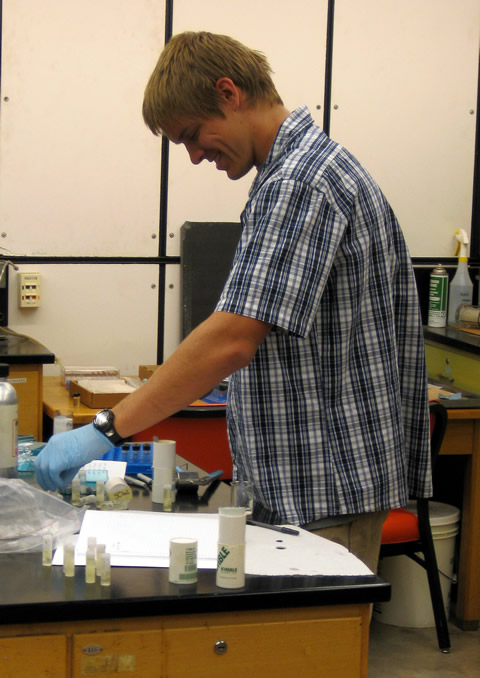Research
The Department of Chemistry and Biochemistry has a vibrant and active research community with our undergraduate students regularly participating throughout the academic year and summers in the research programs of the department's twelve full- and part-time faculty members. Some 20 refereed publications have appeared in the last five years (2009-2014), half of these with student co-authors. In addition, some 40-50 poster presentations have been given during this same period at professional meetings including the American Chemical Society, Pittsburg and Gordon Research Conferences, the National Science Teachers Association, and Project Kaleidoscope Workshops.
The college's library has online access to the entire collection of the American Chemical Society and most Academic Press and Elsevier journals in addition to some 60 cognate journals for both teaching and research use. Furthermore, the college subscribes to such databases as SciFinder Scholar and Web of Science to assist research efforts by all faculty members.
The department is home to an array of modern-day instrumentation for undergraduate use and has dedicated laboratory space for collaborative faculty-student research. Research programs within the department range from the development and application of novel nano-optical sensors, material culture conservation, issues facing energy and the environment, biogeochemical nitrogen cycling in the Arctic, to the design and development of new antibiotics based on natural product scaffolds. For more information about specific research programs of the faculty, please consult their individual web pages or contact them directly.
The role of student/faculty collaborative research in the Department of Chemistry and Biochemistry
Student research plays an important role in the training of new scientists. Our goal for your research experience (either during the block or during the summer) is that you gain experience in the techniques of a chemistry sub discipline that you have strong interest in. We also want to strengthen your critical thinking skills in the discipline. You will be expected to think creatively, solve problems independently, and talk and write knowledgably about what you are researching. You are also expected to demonstrate the dependability, work ethic, attention to ethics, and awareness of safety required of a professional scientist. Research is incredibly rewarding, but at times it can be hard, frustrating, and tedious. If you are looking for an "easy block" or to get paid for hanging out in the lab for the summer you have yet to build a good idea of what research is.
Research by the block
Are you thinking of a block of research as an elective in the chemistry major or for your requirement in the biochemistry major? Perhaps you would like a research block as a block to count toward your minor in chemistry or biochemistry or just because you want in depth exposure to research in this discipline. You will want to start planning your research block a year to a year and a half in advance. Read the research areas of the faculty members. Schedule (probably by e-mail) a time to talk to the faculty member you are interested in working with. You will want to find out what the pre-requisites are for the project you are interested in working on. (Will you need to take organic, biochemistry or analytical before participating in this type of research?) Before block 7 pre-registration determine when the research blocks are for the faculty members you are interested in researching with and confirm that they are willing to take you as a research student for these blocks. Design your schedule so that this block is open for research. You will not need to bid any points on the research block, but you will need to fill out an independent study form with your faculty mentor.
Summer Research
There are opportunities for 10 weeks of stipend supported summer research at Colorado College or the possibility of combining a 3.5 week summer block (you pay tuition and receive academic credit for this portion of the research) with 6.5 weeks of stipend supported summer research. This amount of time will allow you to both learn techniques relative to the discipline you are conducting research in and make incremental to significant progress on the project. Many of our summer students have obtained enough data to present their research at local, regional, national, and domestically held international meetings in the discipline. If you do participate in summer research you will be required to present your findings at some level to the broader scientific community.
How do you get involved in summer research? You should start planning 1.5 years to 6 months in advance. Most positions for summer research in the department are being decided by professors by the third week of Block 5. You will need to talk to between 2 and 3 of us about our research. You will want to do this well in advance of block 5! (Make an appointment by e-mail, we are expecting to meet with you and we are happy to talk to you about research, but if you just drop in you may catch us at time that we are busy doing something else. Unintentionally we may come across as gruff or dismissive, but really you have just caught us at time when we do not have time to speak about our research.) When you do talk to us we will tell you about our ongoing projects and you should mention any independent ideas you think we could mentor you with. Depending on factors of time, funding, and feasibility you may have the option of pursuing a project of your design or working with us to advance existing research (you will have a fair amount of room for independent on either type of project). As part of the project discussion be sure to talk about funding options. We will have ideas if you don't know where to start on funding. Due to legalities of insurance coverage of you, of our instruments, and of other school property, and issues of equity we cannot allow you to volunteer for summer research.
National Science Foundation - Research Experience For Undergraduates(NSF-REU): The Research Experiences for Undergraduates (REU) program supports active research participation by undergraduate students in any of the areas of research funded by the National Science Foundation. REU projects involve students in meaningful ways in ongoing research programs or in research projects designed especially for the purpose.
NSF funds a large number of research opportunities for undergraduate students through its REU Sites program. An REU Site consists of a group of ten or so undergraduates who work in the research programs of the host institution. Each student is associated with a specific research project, where he/she works closely with the faculty and other researchers. Students are granted stipends and, in many cases, assistance with housing and travel. Undergraduate students supported with NSF funds must be citizens or permanent residents of the United States or its possessions. An REU Site may be at either a US or foreign location.
For the Locations of NSF-REU Sites in Different Disciplines, Click on the Various Links Below:
REU: Astronomical Sciences
REU: Atmospheric Sciences
REU: Biological Sciences
REU: Chemistry
REU: Earth Sciences
REU: Engineering
REU: Materials Research
REU: Ocean Sciences
REU: Physics
REU: Polar Programs
show all / hide all



